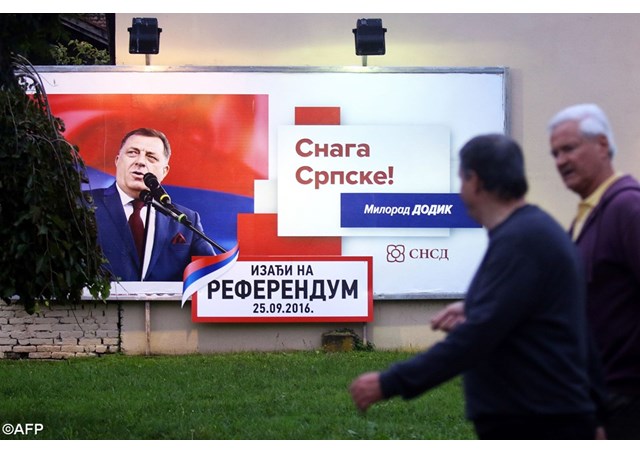
Bosnia's Serb Republic holds controversial referendum

(Vatican Radio) The Serb mini-state within Bosnia-Herzegovina is holding a referendum this weekend despite international concerns that it could be part of an attempt to secede from the already volatile country and spark a proxy war between Russia and the West. Sunday's referendum on a national holiday is held more than 20 years after the end of Europe's worst conflict since World War II.
Listen to Stefan Bos' report:
The vote asks residents of Bosnia's Serb Republic, known as Republika Srpska, whether to maintain a national holiday on January 9, despite a Constitutional Court ruling against the referendum.
Bosnia's top Court said the proposed date discriminates against Muslim Bosniaks and Catholic Croats since it falls on a Serb Orthodox Christian holiday.
The referendum on "Statehood Day" is Bosnia's first since a 1992 vote on secession from then-Yugoslavia ignited three years of ethnic war in which more than 100,000 people were killed.
Balkan observers see it as a dress rehearsal for an attempt to secede from Bosnia, which was divided after the war between the Serb-run region and the Bosniak-Croat Federation.
East-West tensions
The vote has also sparked wider tensions between Western nations which are supporting the Bosniaks and Croats and Russia, which is backing the Serbs.
In a statement, the U.S. embassy in Sarajevo threatened unspecified "consequences" if the referendum is not canceled, while the Russian ambassador openly supported the referendum, calling it is an "act of democracy".
And in an act of defiance, Russian President Vladimir Putin and the President of Republika Srpska, Milorad Dodik, met in Moscow ahead of the referendum on Thursday officially to discuss the situation in the Balkan Peninsula.
Bosnian Serbs declared in 1992 the creation of their own state within Bosnia on January 9. That's no surprise as it is the traditional Serb Patron Saint's Day.
During the war that followed, Bosnian-Serb forces expelled non-Serbs from the territory they controlled in an effort to make it part of neighboring Serbia.
Statehood day
Although Republika Srpska ended up not independent but an autonomous region of Bosnia, they still celebrate January 9 as a national holiday.
Yet, non-Serbs living there the date is a symbol of their expulsion and a sign that Republika Srpska is still a place meant just for Serbs.
The region saw much bloodshed, including Europe's worst single massacre since the Second World War in the Bosnian town of Srebrenica. Some 8,000 Muslim men and boys were killed there after Serb forces overran in the town in 1995.
Despite the controversies, Bosnian Serb prime minister Zeljka Cvijanovic has made clear that the vote should be held anyway. Especially Muslim Bosniaks now fear fear that the disputed referendum is a test for a more serious one in 2018 — on Republika Srpska's independence from Bosnia.
The referendum is also closely watched internationally as the central authorities of the divided country seek membership of the European Union.
| All the contents on this site are copyrighted ©. |


